At Intel Innovation 2022, we saw an upcoming GPU with a twist. We got to see the upcoming Intel Arc A770 GPU hands-on. This is the company’s upcoming desktop GPU targeted at the mid-range market. The GPU was shown off at a lunch event, and it has a fun backstory. We even learned something new about the desktop GPU line from Intel during the event.
Intel Arc A770 GPU at Innovation 2022
Here is the Intel Arc A770 GPU. It has two fans and is a dual-slot card.
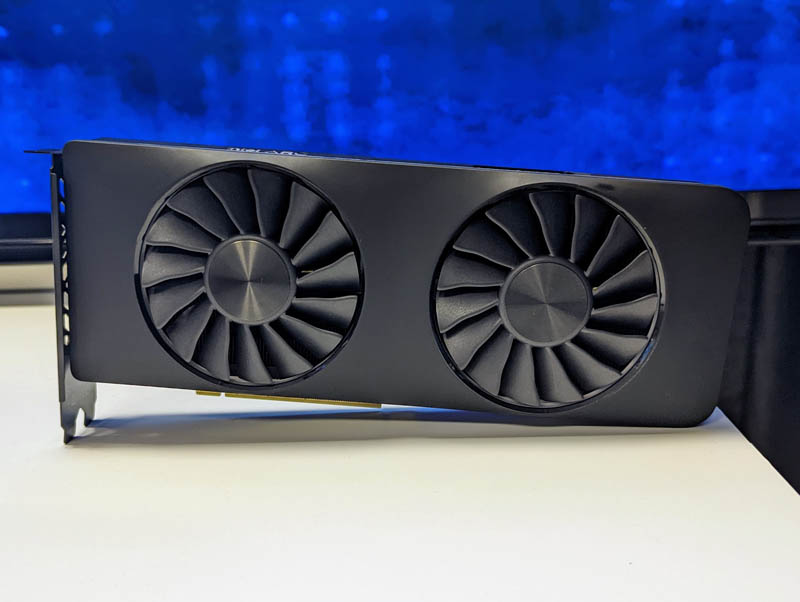
The back of the card shows the Arc A770 Limited Edition branding. Slighly surprising is that Intel did not put “Intel” on the backplate. As a quick note, we like the clean backplate design as when we review more expensive NVIDIA cards like the NVIDIA RTX A4500 20GB GPU and they do not have a backplate, it feels strange. The backplate helps with structural rigidity to keep the PCB and components on its backside safe.
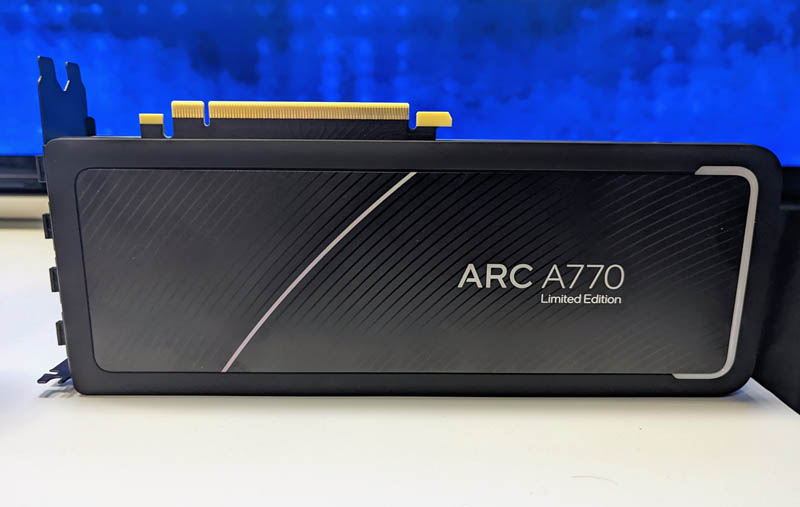
Here we can see 6-pin plus 8-pin power along the top. We also get the Intel Arc Branding.
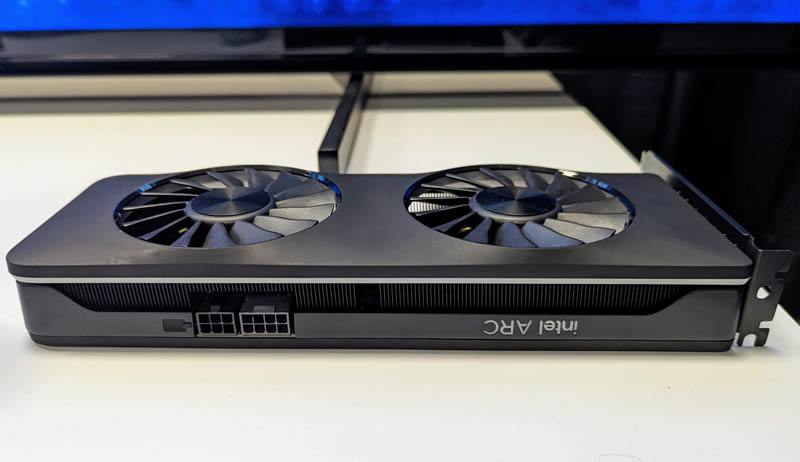
The end of the GPU has holes for GPU supports, becoming more common in workstations. One can also see all of the lighting channels through the GPU.
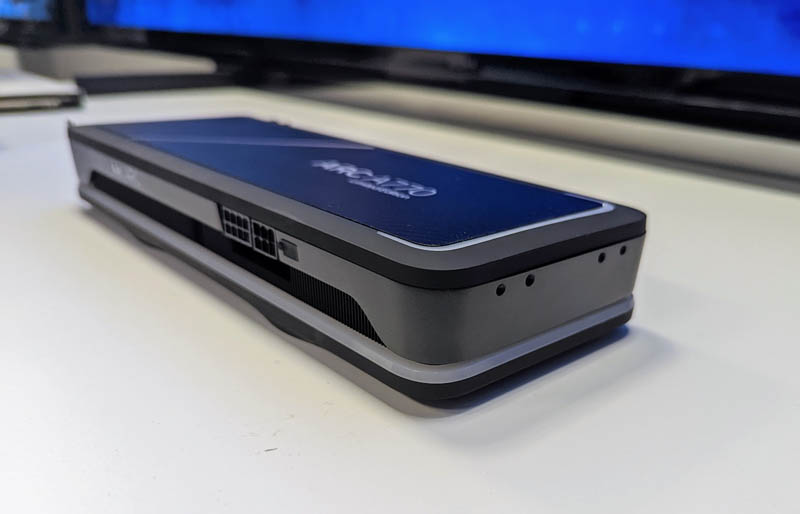
On the backstory part, this GPU was part of an event where Intel showed off the liquid-cooled Ponte Vecchio module, its new Flex GPUs, and the Arc GPU line. Raja, Jeff, and Lisa held their respective products.

The photos were taken just after the event. The fun nugget about this particular Arc A770 is that the card has a particular owner. The A770 we photographed and Lisa Pearce (VP in Intel’s AXG and known as the head of Intel’s graphics software for years) is holding in this photo she gave an interesting backstory on the card. She said she actually took this card out of her personal system and brought it to the event to show.
Final Words
It was cool to see an Intel VP pull a card out of the system they use and bring it to the event. Often executives at tech companies do not use their own products regularly unless it is in a notebook. It was refreshing to hear that story.
At the event, I also confirmed a key detail. Intel is not going to limit its desktop cards to desktops only. Unlike NVIDIA’s CUDA license, the company said it was not planning to prohibit their use in servers. That was a welcome announcement.

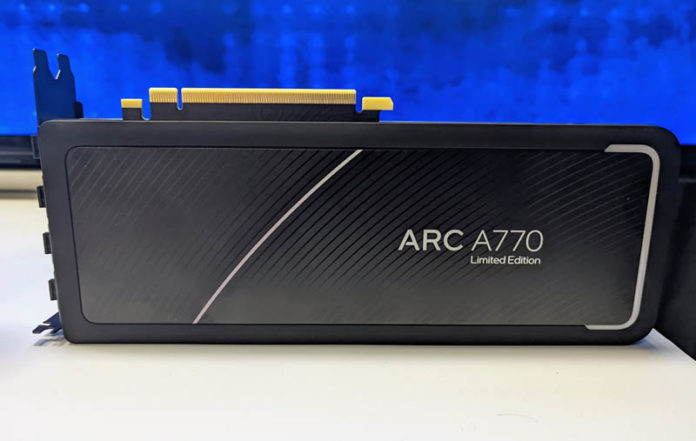
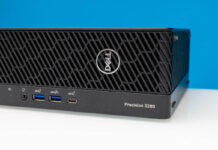
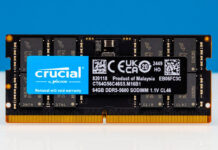
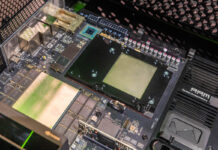
Any clue what that port is next to the 6P PCIE power connector?
My actual first guess is a 3-pin A-RGB (or D-RGB if one prefers) hookup, for lighting control. Beyond that, who knows – engineering sample something or other.
It is an RGB lighting header.
>>I also confirmed a key detail. Intel is not going to limit its desktop cards to desktops only. Unlike NVIDIA’s CUDA license, the company said it was not planning to prohibit their use in servers.
So this means Intel cards will be SR-IOV enabled for server use…? And without requiring an additional license? If so, this would be very welcome news indeed.
@Patrick: Please contact Intel and confirm that SR-IOV is available on consumer cards like @Scotland above also asked.
THAT would be a reason to buy into Intel GPUs.
Other than that, price to performance is not that great compared to now cheap AMD RDNA2 and NVIDIA Ampere cards. Plus it will take Intel years to fully fix drivers, if Intel consumer GPUs still have a future by then at all.
With rumors hinting that Intel consumer GPU line will quietly abandoned, it is hard to buy into that ecosystem.
It seems Intel will not be remotely competitive with coming generations (Battlemage and Celestial), and that they are only now selling the stock they already had produced half a year ago, wont produce more Arc cards beyond those, and focus on non-consumer GPUs in the future.
NVIDIA & AMD seem to be to competitive, and Intel unwilling to eat losses for 2-3 years until it could make profits.
We will see how this pans out and if the rumors are true.
I certainly hope for a 3rd competitor, and Intel would be great for me: FOSS drivers, great Encode/decode acceleration, and SR-IOV (If True).
They said at the event that there would be a difference in SR-IOV between data center and consumer cards but did not get into specifics. At the same time, remember per the NVIDIA license you are not supposed to run GeForce in data centers at all.
NVIDIA cracked down because people were doing things like this: https://www.servethehome.com/deeplearning10-the-8x-nvidia-gtx-1080-ti-gpu-monster-part-1/
if this had working SR-IOV, it would be an instant buy. sadly it will be a long time until it just works… to quote from their github “SRIOV upstream task is on-going, ETA Q4’23”. see: https://github.com/intel/linux-intel-lts/issues/33